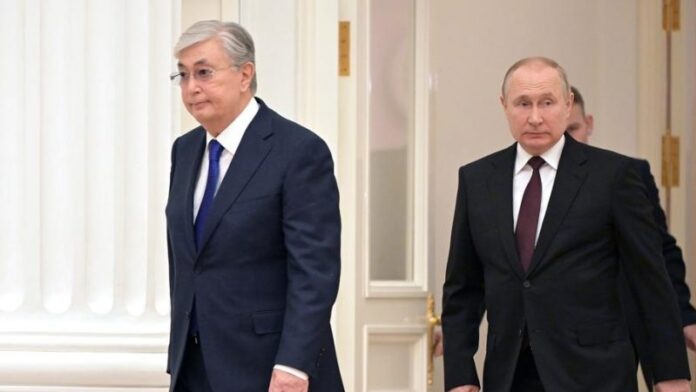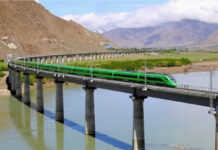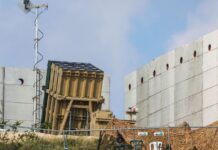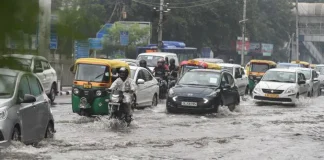Kazakhstan can be a good starting point for studying the impact of the ongoing Russia–Ukraine conflict on the Central Asian States (CAS). It is the only CAS sharing a land boundary with Russia, stretching almost 7,644 kilometres, and has a sizeable Russian minority on its territory. The Kazakh situation is somewhat analogous to Ukraine regarding the concentration of ethnic Russians in northern Kazakhstan, adjoining Russia, mirroring eastern and southern parts of Ukraine.
By Gitesh Sarma
Declining Ethnic Russian Population
Kazakhstan’s demography in the country as a whole has changed since it became independent in 1991, with the proportion of Kazakhs rising steadily. In 1989, ethnic Russians were 37.4 per cent of the population, which was almost equal to ethnic Kazakhs at 39.6 per cent. However, by 2016, the Russian population in Kazakhstan had declined to about 21 per cent. The share of ethnic Russians in Kazakhstan’s population is now estimated at only 18 per cent of 19 million.
Notwithstanding the change in the composition of Kazakhstan’s population on account of the emigration of Russians and the inflow of expatriate Kazakhs into the country, the situation in northern Kazakhstan is different, with ethnic Kazakhs being a minority at 35.03 per cent of the population in this region. On the other hand, ethnic Russians in northern Kazakhstan are estimated at 49.53 per cent. The sizeable Russian landmass nearby may be the cause of a minority syndrome in the Kazakh majority of Kazakhstan. Russians in northern Kazakhstan could look towards Russia to protect their interests, creating a feeling of vulnerability among Kazakhs. On 10 June 1998, the Government of Kazakhstan had transferred the national capital from Almaty, located on the southern periphery, to Astana in central Kazakhstan, perhaps with the intention of reinforcing the government’s authority over the entire territory of the country from a more central location.
Kazakh National Sentiments
Periodic statements made by influential Russians suggesting that Kazakhstan was an artificial construct have not helped. On 29 August 2014, Russia’s President Vladimir Putin said Kazakhs never had any statehood. On 10 December 2020, Vyacheslav Nikonov, Chairman of the Education and Science Committee of the Russian Duma, said that much of Kazakhstan’s territory was a great gift from Russia and the Soviet Union. Nikonov also said, “northern Kazakhstan was not inhabited at all. Kazakhs had existed, but much further to the south”. On 15 December 2020, the Former Kazakh President Nazarbayev reacted angrily and the Kazakh Ministry of Foreign Affairs (MFA) delivered a note of protest to the Russian Embassy.
In his address to the nation on 21 February 2022, President Putin had rejected the notion that Ukraine ever had “real statehood” and claimed that Ukraine had always been a part of Russia’s “own history, culture, spiritual space”. When provoked, Kazakhs have appeared eager to defend their distinct identity. In 1986, the Soviet leadership had replaced long-standing General Secretary of the Communist Party of Kazakhstan Dinmukhamed Kunaev with the non-Kazakh, Gennady Kolbin (a Russian). Although the widespread protests were suppressed, the Soviet leadership replaced Kolbin with ethnic Kazakh Nursultan Nazarbayev.
In recent times, issues relating to China have also been expressed. In 2016, protests had targeted the draft bill, which would have allowed the leasing of land by foreigners for 25 years. These protests were mainly aimed at Chinese nationals, increasingly visible in the country. In May 2018, the Kazakh President Tokayev signed a bill into legislation banning the sale and leasing of agricultural land to foreigners. With this law, Kazakh leadership hoped to adequately address public anger about Chinese entrepreneurs grabbing land in the country. Moreover, in April 2020, Kazakh MFA protested to the Chinese Ambassador after a Chinese website (Sohu.com) wrote that Kazakhstan had been a “vassal of the Qing dynasty”.
Russia and Stability in Kazakhstan
While Kazakh nationalism manifests itself from time to time in various forms, the paradox is that Kazakhstan’s leadership may be dependent on Russia for its survival in extreme situations. In January 2022, there were violent demonstrations in Kazakhstan in response to the government’s decision to lift the price cap on liquified petroleum gas from 1 January 2022. The protests started in the oil-producing city of Zhanaozen and spread to other cities, including the largest city, Almaty, and acquired a political dimension. Responding to Kazakh President Kassym-Jomart Tokayev’s request, the Russia-dominated Collective Security Treaty Organisation (CSTO) deployed troops to support the Kazakh Government. The protests were believed to have led to over 200 deaths.
Apart from Russia, China with its comprehensive capabilities, has a big presence and stakes in Central Asia and Kazakhstan and therefore its conduct in this crisis is of interest. China has both extensive commercial interests in the country and security concerns on account of Uyghurs and other cross-border ethnic linkages. While China is an influential player in Kazakhstan, initially, it kept a low profile during the January 2022 crisis. However, after President Tokayev’s speech on 7 January 2022 blaming terrorists trained abroad for the violence, China’s President Xi Jinping offered support to put down the attempt to engineer a ‘colour revolution’ in Kazakhstan. In the end, China should have been satisfied with the intervention by Russia and CSTO in support of the Kazakh Government.
Russia and China are not the only big players in the country. Kazakhstan is a resource-rich country, and in 2022 almost 600 US firms were operating in Kazakhstan with an investment of US$ 45 billion. In addition, US companies had made a cumulative investment of US$ 161 billion in the energy sector from 2005 till 2020. Of this, US$ 30 billion came directly from the US.
The Russia–Ukraine Conflict Since 2014
In a sense, the ongoing Russia–Ukraine conflict is a continuation of the process which began in 2014 with the Maidan protests in Ukraine, leading to the overthrow of pro-Russia President Viktor Yanukovych with encouragement from the West. Kazakhstan had agreed with the 16 March 2014 referendum in Crimea to legitimise Russian annexation as “yet another manifestation of realising a nation’s right to self-determination”. However, in response to Ukraine’s concerns, the Kazakh side explained that it neither recognised the referendum nor the annexation. Still, the Crimean people had legitimate security, humanitarian and other interests. It could be argued that Kazakhstan has avoided explicitly criticising Russia, Ukraine or the West. But in different ways, it has favoured Russia.
Official Kazakh Response to the Conflict
This time as well, Kazakhstan’s response to the Ukrainian conflict appeared as weighed in favour of Russia. In his address to the 22nd Extraordinary Congress of the ruling Amanat Party on 1 March 2022, President Tokayev called on Russia and Ukraine to find common ground and reach an agreement at the negotiating table. He said that a bad peace was better than a good war. He went on to say that “the principle of indivisibility and commonality of security stipulates mutual understanding based on mutual trust. Unfortunately, this has not happened. The Minsk agreements had remained only on paper, which led to the military operations on the territory of Ukraine”. Kazakhstan offered all possible assistance, including mediation if, of course, it was required.
When President Putin discussed the Ukrainian situation with Tokayev the next day, the latter pushed for a compromise between Russia and Ukraine. Kazakh authorities also discouraged anti-Russia protests. In early March, Kazakh authorities had allowed anti-war activists to hold a rally in Almaty against Russia’s invasion of Ukraine in which about 2,000 demonstrators had taken part. But Kazakh authorities were understood to have refused permission to hold a similar protest rally on 19 March 2022.
Some reports from the West suggested that Kazakhstan had denied the Russian request to let its troops participate in the offensive in Ukraine and indicated that it would not recognise the so-called Republics of Donetsk and Lugansk. Previously, Kazakhstan has not recognised Russia’s annexation of Crimea and the so-called republics of Abkhazia and South Ossetia, Georgian territories occupied by Russia after the August 2008 Russia–Georgia war.
Protecting Kazakhstan from Sanctions on Russia
What came out more strongly was a sense of urgency for Kazakhstan to shield its economy from western sanctions on Russia. Apart from traditional economic and other linkages, Kazakhstan is a member of the Eurasian Economic Union (EAEU) and the Eurasian Customs Union, along with Russia, Armenia, Belarus and Kyrgyzstan. Kazakhstan’s MFA tasked its Embassies to engage with key European ports authorities urgently. Kazakh MFA also initiated a study of the impact of sanctions on Russian transport and logistic companies.
On 11 March 2022, Kazakhstan engaged in online consultations with the US on sanctions. It appears that this was a Kazakh initiative, with almost 80 participants from the Kazakh side in what was, in effect, a workshop on the sanctions. The American team briefed the Kazakh participants on the new trade, economic, banking, financial, and energy sanctions.
There are reports that Kazakhstan is attempting to redirect imports and exports away from Russian ports to Latvia to avoid international sanctions. The Caspian Sea Pipeline Consortium (CPC), stretching over 1,500 km, connects the Tengiz oilfield in Kazakhstan to Russia’s Black Sea port of Novorossiysk. This pipeline accounts for 2/3 of Kazakhstan’s oil exports. The US has excluded the Chevron-led Caspian pipeline concession from its ban on Russian oil and gas imports in an attempt to leave open this export route, provided that the crude oil is not of Russian origin.
In a virtual meeting with Central Asian Foreign Ministers held on 28 February 2022, the US Secretary of State Antony Blinken condemned Russia’s attack on Ukraine and reiterated Washington’s support for that nation’s sovereignty, independence and territorial integrity. His Central Asian colleagues however did not join him in expressing similar sentiments.
Conclusion
Kazakhstan’s immediate priority is to safeguard its economic and commercial interests by ensuring that the sanctions imposed on Russia by the West do not adversely impact its exports. However, alternative transit options, such as China and Iran, have limitations.
The Russia–Ukraine conflict has put Kazakhstan’s foreign policy to a severe test with no easy solutions. There are similarities between Ukraine and Kazakhstan, but they should not be exaggerated. A critical provocation for Russia in its ties with Ukraine was the prospect of NATO at its doorstep. This may not be the case with Kazakhstan, although Russia would tend to keep a watchful eye on American activities in Central Asia even without the NATO factor.
During a telephonic conversation with President Putin on 2 April 2022, President Tokayev said that “a common understanding was expressed of the exceptional importance of reaching agreements on the neutral, non-aligned, nuclear-free status of Ukraine”. Therefore, Kazakhstan seems to agree with Russia on the terms on which the war with Ukraine can be ended. In Kazakhstan’s approach to the Russia–Ukraine conflict, it is possible to discern a distinct tilt in the direction of Russia.
This article first appeared in www.idsa.in and it belongs to them.








